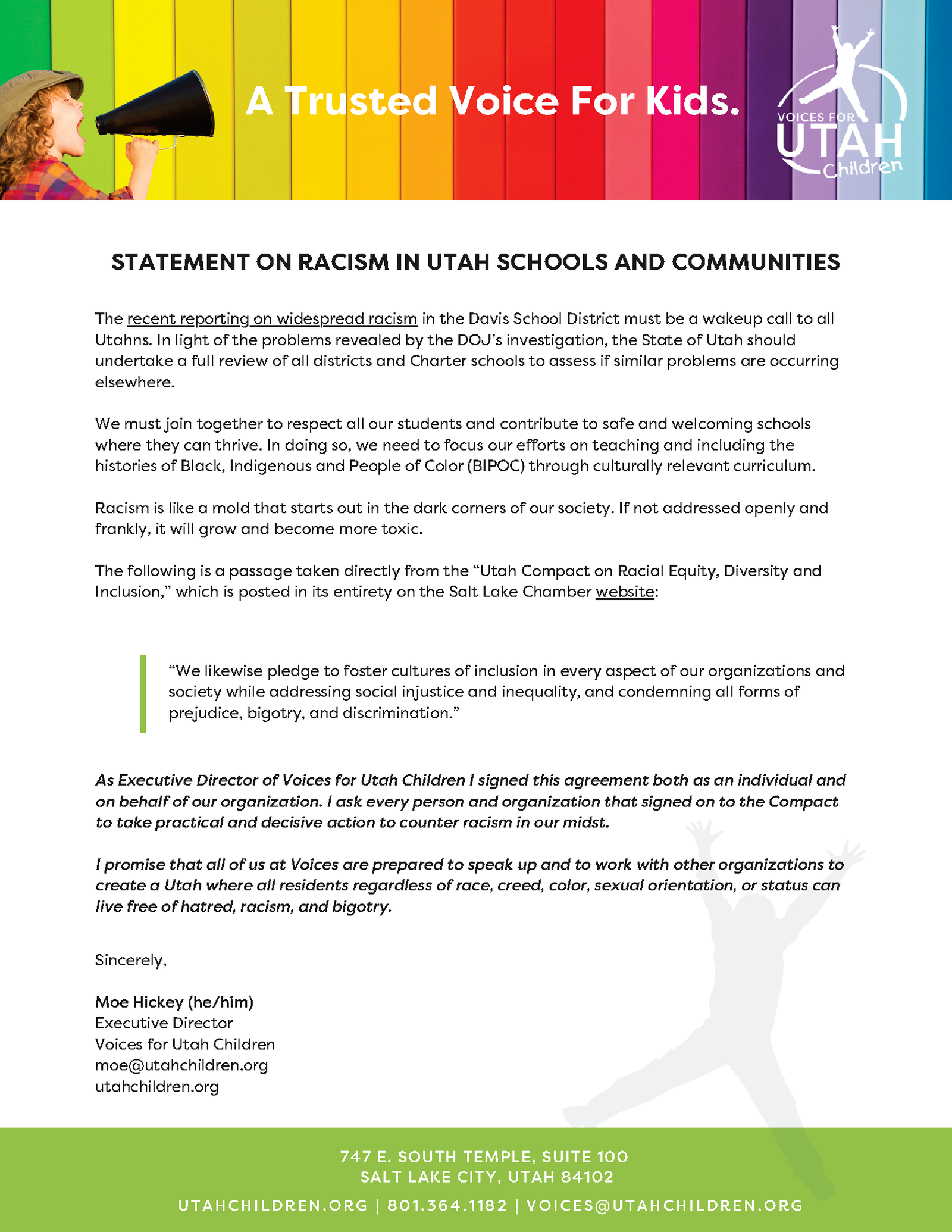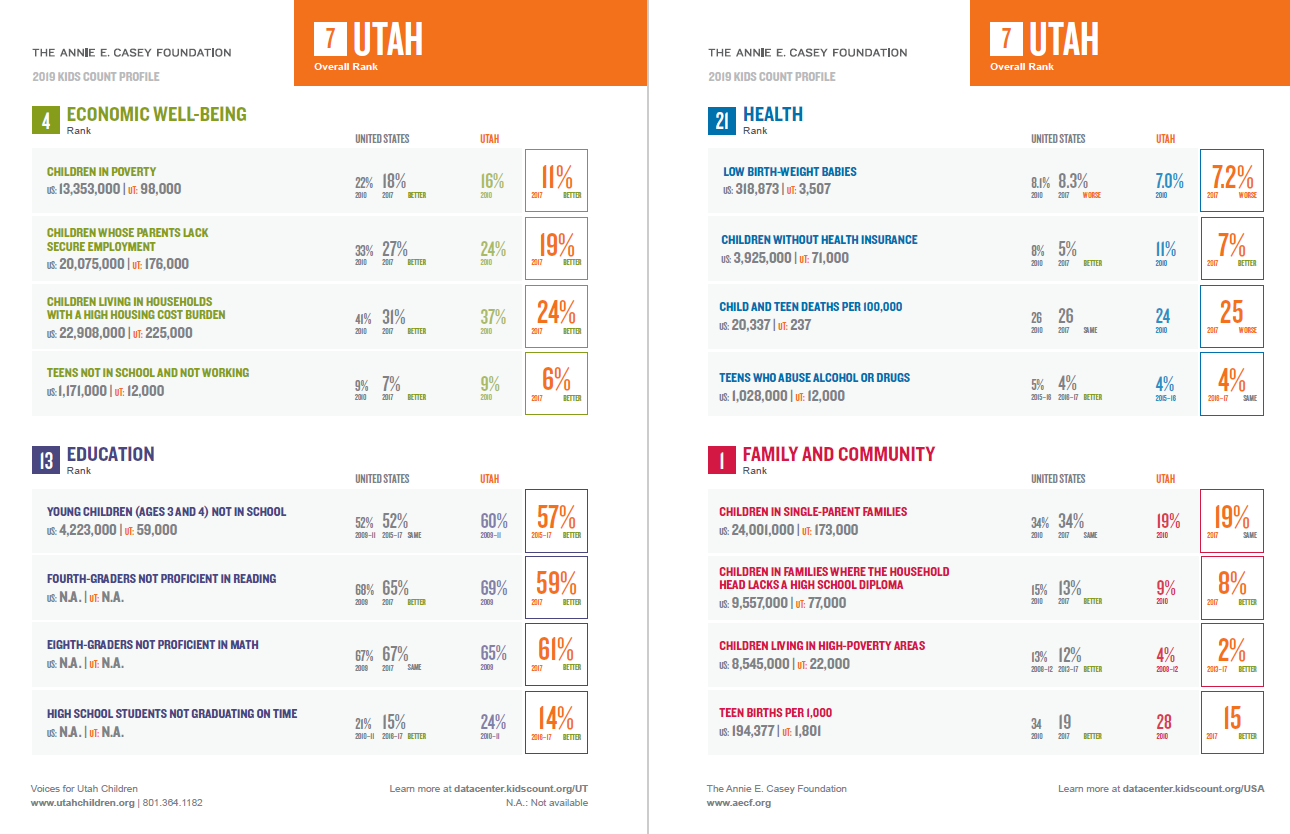Federal Policy
Voices Statement on Racism in Utah Schools & Communities
The recent reporting on widespread racism in the Davis School District is not just a wake up call to all Utahns, but the direct result of the legacy we have fostered by leaving racism unchecked, ignored, and accepted. Now is the time to take action.
We at Voices are committed and prepared to speak up and to work with other organizations to create a Utah where all residents regardless of race, creed, color, sexual orientation, or status can live free of hatred, racism, and bigotry.
Here are some of the ways you can help support the actions we are currently working on:
- Support our 100% Kids Coverage Campaign to help strengthen healthcare access for Utah families regardless of where they live or where they were born by sharing your story on health coverage here.
- Learn more about current Juvenile Justice issues disproportionately impacting youth of color in our state.
- Submit a comment on the proposed DACA rule to ask the Biden Administration to strengthen the DACA program rather than leaving it open to the possibility of removing workers permits to the hundreds of thousands of DACA recipients in this country.
- Read why we are pushing to get access to full day kindergarten for all Utah kids.
Our full statement can be found below or downloaded here.
Beginning this Summer 2021, Utah Local Education Agencies (LEAs) will be receiving approximately $615 million in Elementary and Secondary School Emergency Relief Funds (ESSER) funds from the American Rescue Plan. Now is the time to use this funding to help our youngest learners that will need the additional instruction and interventions now more than ever.
In this explainer, Voice's staff Anna Thomas and Laneta Fitisemanu will cover the ESSER funding Utah is set to receive as well as ways that we can use the funds and support full day kindergarten and preschool expansion.
We have exactly two school years (2021-22, 2022-23) and three summers (2021, 2022, 2023) to spend these funds. It is critical that we think big picture about where we invest this money when it comes to education.
We have strong data and evidence supporting that full day kindergarten and preschool programs help improve learning gaps for children that participate particularly for our most vulnerable and underrepresented student groups. This is why using ESSER funds to help expand these much wanted and needed programs is critical and one of the most important investments we can make that will have a huge impact for years to come.
Let's invest in Utah kids by using this relief funding to expand early education programs and further support the value and importance of giving more of Utah children and families access to full day kindergarten and preschool programs!
Resources and References
Local education authorities, the state Office of Education, and the Office of Child Care have received hundreds of millions of dollars that can and should be spent to invest in what is best for Utah’s children.
We must work together to put these investment dollars to use with creative, community-supported solutions that help all Utah families with young children.
Let’s rise to the occasion and build quality early care and education plans and programs that work best for Utah kids!
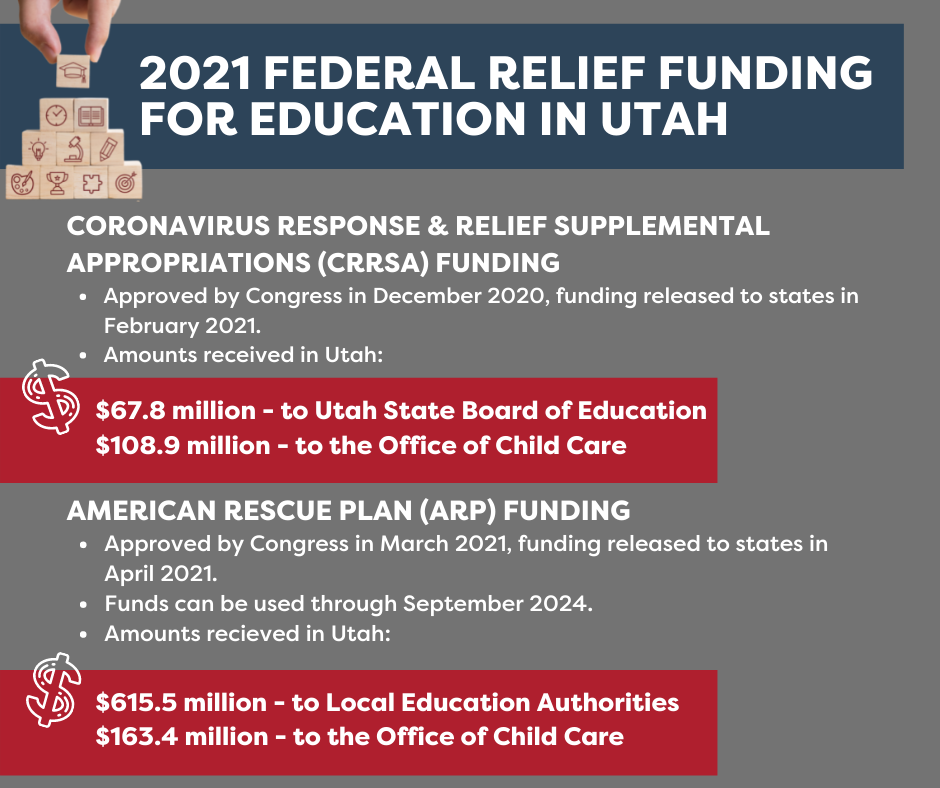
NOW IS THE TIME TO MAKE BOLD PLANS IN YOUR COMMUNITY!
Here are some ways that American Rescue Plan funding can be used in your community to support early childhood care and education:
- Free summer enrichment programs for families in need of academic support as well as child care!
- Expanded full-day kindergarten opportunities to ensure all kids in your community can get caught up and start first grade on par with their peers!
- On-line and in-person home visiting support for families with young children who want and need extra guidance regarding child development, safety and nutrition, and family financial stability.
Click to download and share our American Rescue Plan for Early Education Flyer
Voices Calls on Gov. Cox to Veto Tax Cuts Now That Their Price Has Doubled Due to "American Rescue Plan"
Voices for Utah Children Calls on Governor Cox to Veto Three Tax Cut Bills Due To New Federal Law
Salt Lake City -- Voices for Utah Children, the state's leading child research and advocacy organization, issued a call today (Friday, March 12, 2021) for Governor Spencer Cox to veto three recently passed tax cut bills, HB 86, SB 11, and SB 153. The organization cited this week's enactment of new federal legislation, H.R. 1319, The American Rescue Plan Act, signed yesterday by President Biden, which cuts federal COVID relief aid to states by $1 for each $1 of tax cuts enacted on or after March 3, 2021. The three tax cut bills in question have yet to be signed by Governor Cox.
Voices for Utah Children's Fiscal Policy Director Matthew Weinstein said, "The three bills in question are tax cuts that almost completely exclude the lowest income 30-40% of Utah taxpayers and mostly benefit the highest-income 30-40% of filers. They permanently reduce by $100 million annually our ability to invest in our urgent unmet needs such as education, public health, poverty prevention, closing majority-minority gaps, infrastructure, clean air, and so on. Now we learned this week that their price has just doubled. Because the new federal COVID relief law penalizes states for tax cuts on a dollar-for-dollar basis, they will actually cost Utah $200 million of revenue next year, not just $100 million."
Voices for Utah Children CEO Moe Hickey said, "This year we've launched our new #InvestInUtahKids campaign to raise awareness of the urgency of making investments today that will bear fruit for our children tomorrow. We applaud the Legislature for adding funds this year for pre-K and Optional Enhanced Kindergarten. At the same time, tremendous unmet needs remain and we cannot lose Federal Funds at this time. We urge Gov. Cox to consider whether it may be best to save these tax cuts for future consideration now that their price tag has doubled."
The federal legislation reads as follows:
A State or territory shall not use the funds provided under this section or transferred pursuant to section 603(c)(4) to either directly or indirectly offset a reduction in the net tax revenue of such State or territory resulting from a change in law, regulation, or administrative interpretation during the covered period that reduces any tax (by providing for a reduction in a rate, a rebate, a deduction, a credit, or otherwise) or delays the imposition of any tax or tax increase.
COVERED PERIOD.—The term ‘covered period’ means, with respect to a State, territory, or Tribal government, the period that— (A) begins on March 3, 2021; and (B) ends on the last day of the fiscal year of such State, territory, or Tribal government in which all funds received by the State, territory, or Tribal government from a payment made under this section or a transfer made under section 603(c)(4) have been expended or returned to, or recovered by, the Secretary.
Federal Policy
The direction of our federal government affects children's issues. Throughout the year we engage with our federal delegation to ensure children’s issues are brought to the forefront of federal policy change. Whether it is on healthcare, economic success, early care, education, or another issue affecting children we want to make sure we are advocated for Utah children and families.
2020 Election Guide to Issues Affecting Children
2020 Election Issues Guide
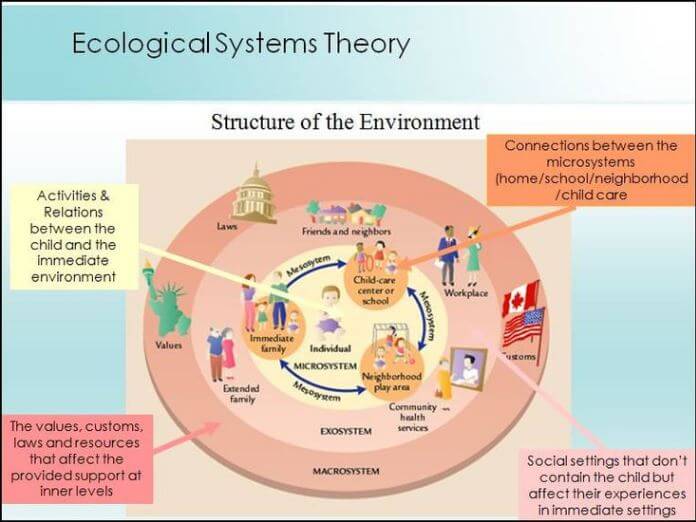 American psychologist Urie Bronfenbrenner formulated the Ecological Systems Theory to explain how the inherent qualities of children and their environments interact to influence how they grow and develop.
American psychologist Urie Bronfenbrenner formulated the Ecological Systems Theory to explain how the inherent qualities of children and their environments interact to influence how they grow and develop.
As Utah grapples with the effects of the coronavirus and COVID-19, this election year challenges us all to think bigger, broader, and longer-term. What lessons must we learn from the public health emergency? What has worked and has not in the actions already taken by state and local authorities? What weaknesses in Utah's economic and social structures were exposed by the pandemic that demand increased attention by Utah's next governor and legislators? What challenges can we now see that we should have addressed years ago to improve our resilience and ability to adapt to emergency circumstances?
While it is certainly true that the direct health effects of the coronavirus impact older adults the most, it is Utah's children who may bear the most lasting scars. Unable to attend school in person, relying on their parents or guardians to be their "home teachers" in a new sense, we already know that tens of thousands of Utah's children will fall behind in ways that will be difficult to make up. The decisions that our new governor and legislators make in the years to come will determine whether and how much our social and economic gaps expand as a result.
The public offices on the ballot in November include:
- Governor and Lt. Governor
- Half of the State Senate
- The entire Utah House of Representatives
Our elected officials play a central role in determining whether all Utah's children have the opportunity to achieve their potential. Will they have access to healthcare and education? Will their families enjoy the economic stability they need to thrive? These are all questions that will be answered by Utah's next governor and legislature.
Voices for Utah Children is providing this Election Issues Guide so that candidates for elected office can better understand the challenges facing Utah's children. We are also seeking to encourage public awareness and dialogue about the needs of children during this year's campaigns so that our new governor and legislature will begin their terms of office prepared to enact effective policies to protect their youngest constituents.
We have divided this Election Issues Guide into five sections:
Tax & Budget/Economic Performance
The Election Issues Guide can also be downloaded as a ![]() 15-page pdf at this link for easier printing.
15-page pdf at this link for easier printing.
Supported by the Annie E. Casey Foundation, our KIDS COUNT® work aims to provide Utah’s legislators, public officials and child advocates with reliable data, policy recommendations and other tools needed to advance the kinds of sound policies that benefit children and families across the state.
In 2019, Utah held on to its ranking among the top ten in the annual Annie E. Casey Foundation KIDS COUNT® Data Book report, coming in at 7th highest in the nation. We especially shined in the subcategory of "Family and Community," where we ranked #1 thanks to our highest-in-the-nation share of two-parent families and low share of children growing up in high-poverty neighborhoods. We also ranked 4th highest in the subcategory of "Economic Well-Being" thanks to our relatively low share of children in poverty.
But we failed to make the top ten in the other two subcategories in the KIDS COUNT® rankings, due to the fact that public policy has fallen short in precisely those two areas: education and health care. We barely outperformed the nation for high school graduation (and fell behind after adjusting for demographics). And we fell behind in the share of children with health insurance, especially among Utah's Latino children, who suffer from the highest uninsured rate in the nation.
All the KIDS COUNT® ranking details are viewable on the chart and links below.
Terry Haven 
Deputy Director
Voices for Utah Children
More Information:
Measures of Well-Being in Utah, 2019
Talking Kids Tour 2019 - A Supplement to the 2019 Utah KIDS COUNT Data Book
Every Utah child deserves the opportunity to reach their full potential, no matter where their family comes from or where they live in our state. No family should be denied care or afraid to seek the care they need. We must ensure that all Utah parents and kids have affordable health coverage and care. That is why Voices for Utah Children spearheads the 100% Kids Coverage Campaign, so that all children in Utah have insurance. Together we can promote healthy communities where all Utah families thrive.
All Utah children, families, and communities should have access to:
 Pre-natal care and insurance, including mental health support for caregivers;
Pre-natal care and insurance, including mental health support for caregivers;- Continuous, comprehensive health coverage and care for all Utah kids;
- Healthy communities and environments, including access to healthy food, clean drinking water and clean air.
To learn more about the 100% Kids Coverage Campaign visit: https://utahchildren.org/issues/100-kids-covered
Contact Jessie Mandle or Ciriac Alvarez Valle


More Information:
What Does the Coronavirus Mean for Families’ Access to Health Care?
New Report Finds Number of Uninsured Latino Children in Utah on the Rise
Voices for Utah Children Opposes New Trump Administration Medicaid Block Grant Guidance
Voices for Utah Children opposes Trump Administration Public Charge Rule
Voices for Utah Children celebrates Utah Medicaid Expansion
Voices for Utah Children believes in a youth-centered juvenile justice system that meets the needs of the children involved in it, while producing positive outcomes for Utah families and protecting community safety. We are committed to the belief that children should be nurtured, educated and given an equitable chance at success in life. That means allowing young people to make mistakes, learn from them, develop accountability to themselves and their communities, and work through their own unique challenges as they prepare for their lives as adults.
Voices for Utah Children advocates for juvenile justice system that is fair, effective and equitable. Such a system creates positive outcomes for different children, using evidence-based and culturally-competent programs, that meets the needs of children from a variety of socioeconomic backgrounds, races, ethnicities, physical and mental abilities, religious paths and belief systems, and sexual orientations and gender identities. We'll know that Utah has a fair, effective and equitable system when the youth themselves, their families and their communities, believe that the system is working in their best interest. In addition, we will see existing disparities between children of different races - in terms of contact with the system, the seriousness of dispositions, and the barriers to exiting the system quickly - disappear.
While we actively engage in policy analysis and advocacy directed at the policymakers who are able to remore structural barriers to youth success, we also work to empower advocates and community members alike, arming people with information that allows them to advocate for the young people in their lives who may be system-involved or at risk for system involvement.
More Information:
April 6, 2020 COVID-19 Update on Utah's Juvenile Justice System in: English, Spanish
April 27, 2020 COVID-19 Update on Utah's Juvenle Justice System in: English, Spanish (Part 1 & Part 2)
Good News for Juvenile Justice Reformers, from the 2019 Legislative Session
Report: Utah children face barriers to accessing defense attorneys
Let's End Racial Disparities in Utah's Juvenile Justice System
 Anna Thomas, MPA
Anna Thomas, MPA
Senior Policy Analyst
Voices for Utah Children
The early years in a child’s life are critically important in terms of social, emotional and cognitive development. All children deserve to start their lives with a real chance to succeed and be happy later in life, but not all children have access to the things that set them up for that kind of future. We believe that when the wellbeing of young children is at the center of public policy and community investment, our entire state does better.
That is why Voices for Utah Children focuses on promoting targeted investments in early childhood care and education, structured to meet the unique needs (and build on the unique strengths) of Utah's many diverse communities. We believe it is possible to build an early childhood system in Utah that supports families with young children by making sure they have access to affordable and appropriate options for their children’s early care and learning—whether children spend their days at home, in formal child care, at public school, or in the care of trusted family and friends.
Anna Thomas, MPA
Senior Policy Analyst
Voices for Utah Children
More Information:
There’s No “Re-Opening” Utah Without More Child Care
National Orgs Call for Emergency Child Care Sector Relief
Three Things Utah Can Do to Ensure Right-Sized Access to Full-Day Kindergarten
Kinship Care Families Need Our Support
Tax & Budget/Economic Performance
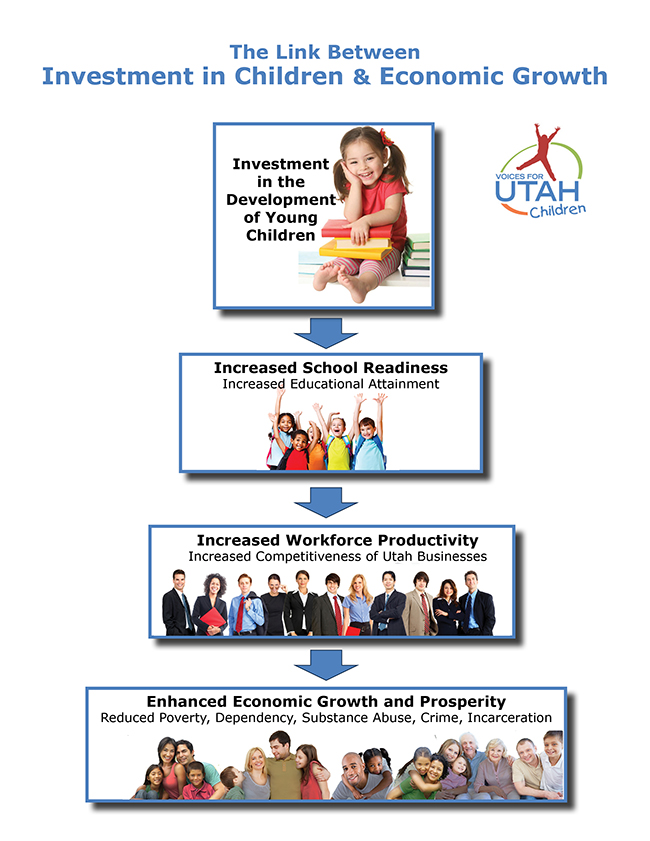
Tax and Budget: Every year, Utah's taxes (income, sales, gas, and property taxes) generate revenues that government then expends in ways that profoundly affect families and communities. The fiscal choices Utah makes — such as whether to invest in Utah's future or give in to the temptation to cut taxes below their current overall low level — will make a critical difference in the lives of the next generation of Utahns. If we make the best choices, we can help foster opportunity for all our children and lay the foundations for Utah's future growth and prosperity.
Last year the Utah State Tax Commission and the Utah Foundation both published research showing that taxes in Utah are the lowest that they have been in 30-50 years, following repeated rounds of tax cutting. Tax cutting is undoubtedly popular, especially in election years, but is it always wise? At some point we need to ask ourselves a difficult question: Is the current generation of Utahns doing our part, as earlier generations did, to set aside sufficient resources every year to invest in our children, in our future, in the foundations of tomorrow’s prosperity and quality of life? And more immediately and specifically, given the Coronavirus Recession's expected impacts on the Utah state budget, should we reconsider the 2018 election-year decision to reduce our income tax rate from 5% to 4.95%, a $50 million tax cut that mostly benefitted high-income households?
Voices for Utah Children's fiscal policy program works to ensure that we invest sufficient resources to ensure that our kids get world-class education and health care as well as special support for children most in need.
At the same time, we also work to ensure that public revenues are generated in ways that are fair. No family should be taxed into poverty as the price of educating their children. Currently, while we've moved in a better direction over the past 25 years, Utah does tax about 100,000 families into or deeper into poverty every year. In addition, the lowest-income Utahns pay a higher overall tax rate (7.5%) than those with the highest incomes (who pay 6.7% of their incomes in state and local taxes). That's one of the reasons why Voices for Utah Children supports making Utah the 30th state in the nation with our own Earned Income Tax Credit (EITC), starting with Utahns working their way out of intergenerational poverty.
Economic Performance: Voices for Utah Children examines and reports on Utah's economic performance from the perspective of how low- and moderate-income Utahns experience the economy -- some examples appear in the links below.
Matthew Weinstein, MPP 
State Priorities Partnership Director
Voices for Utah Children
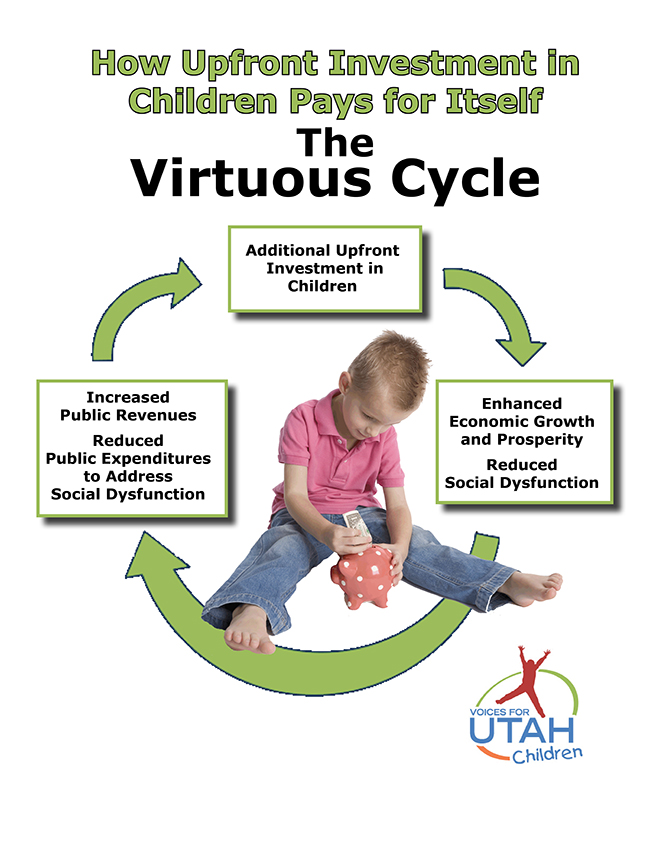
More Information:
Why Utah Should Invest In Our Future, Not Tax Cuts
Why Should Utah Become the 30th State with Our Own Earned Income Tax Credit (EITC)?
The History of Tax Incidence in Utah 1995-2018
Inequality in Utah Compared to Other States and the Nation
Utah Working Families Economic Performance Benchmarking Project: Utah vs. Idaho
National Orgs Call for Emergency Child Care Sector Relief
Child care in Utah has always been critical to our state's economic health - and to the health, safety and well-being of the children of working families. In the current emergency situation, the preservation and support of this sector is even more urgent. We know that our state and local leaders are doing their best to support child care providers and working families in this time of incredible disruption and uncertainty. Those leaders need financial support and resources from the federal government to ensure that our local child care providers survive this unprecedented disruption to their service provision.
In support of the efforts of our national advocacy partners, who are leading the charge with regards to federal policy to protect and sustain the child care sector, we are publishing in its entirety this press release from the National Association for the Education of Young Children and the Early Care & Education Consortium. Released early Sunday morning (March 22), it calls for immediate federal acknowledgement of the urgent need for intervention on behalf of our child care sector across the country.
 Without Immediate Relief, More than Half of Licensed Child Care Will Close in Next Week
Without Immediate Relief, More than Half of Licensed Child Care Will Close in Next Week
National Industry Organizations Call on Congress for $50 Billion in Urgent Stimulus
WASHINGTON (March 22, 2020)--Today, the National Association for the Education of Young Children (NAEYC) and the Early Care and Education Consortium (ECEC) joined advocacy organizations from around the United States in making a request for up to $50 billion in emergency stimulus funding to keep the child care industry from collapsing.
To support American families, sustain industries that are necessary in this public health crisis, and buttress the herculean efforts of medical professionals, lawmakers must recognize child care as the backbone. Yet, NAEYC and ECEC data show that within the past week, child care has lost upwards of 70 percent of daily attendance and that most providers have just a week until they will close their doors, in many instances, permanently.
The immediate and sustained hit from the COVID-19 crisis is devastating. “We are calling on Congress to take swift and immediate action to stabilize an essential yet economically fragile industry,” said NAEYC CEO Rhian Allvin. “In order to stabilize this field, continue to provide essential services for families who need it, and be prepared to support the workforce after this crisis, we are requesting up to $50 billion in emergency stimulus funding.”
“We estimate that without immediate financial support thousands of child care centers and family child care homes will be unable to cover their fixed costs within the next month,” said ECEC Executive Director Radha Mohan. “Providers need a quick and simple way to access emergency assistance in order to do things like pay occupancy costs, maintain payroll and benefits, and pay incentive pay to those educators and support staff willing to continue to work to care for the children of essential personnel for the duration of this crisis.”
Two million early childhood educators comprise the child care workforce. At this swift rate of closures, immediate unemployment of more than half the workforce is inevitable. Little Learners Child Care Center is the only center based child care in Norman County, MN. Little Learners is housed on the samecampus as a nursing home, residential assisted living apartments, hospital, and clinic and provides daily intergenerational activities to those living on site. Center director Karen DeVos said, “this is the most devastating experience of my career. We are currently losing tuition but our costs are increasing to meet the small group size recommendations that allow us to serve children safely. Without help soon, we will be forced to close, leaving 14 staff members without jobs and many families in the emergency and health care fields without care.”
“We are in a no-win situation” said Chad Dunkley, President and CEO of New Horizon Academy, a Minnesota-based chain of child care centers. “We are working hard to support our employees who have been classified as essential, but have been forced already to begin substantial furloughing due to this crisis. We are a family-owned business, and without immediate emergency support, our 88 centers serving 11,000 children across the country will close in a month.”
Both NAEYC and ECEC are partnering with governors across the country to systematically support ongoing child care for an essential workforce. As crucial decisions are being made to protect the health and safety of children, health workers, and educators, “it is imperative that Governors not stand up provisional, unlicensed, and barely regulated child care that could endanger children,” said Jo Kirchner, CEO of Primrose School Franchising Company. Tom Wyatt, CEO of KinderCare added, “We urge Governors to coordinate with existing licensed and regulated providers to ensure the continuity of care and the health and safety for children of essential workers.”
# # #
NAEYC’s vision is that all young children thrive and learn in a society dedicated to ensuring they reach their full potential. NAEYC promotes high-quality early learning for all children, birth through age 8, by connecting practice, policy and research. We advance a diverse, dynamic early childhood profession and support all who care for, educate, and work on behalf of young children.
The Early Care and Education Consortium (ECEC) is a non-profit alliance for the leading high-quality multi-state/multi-site childcare and education providers, state associations, and premier educational services providers, representing over 6,000 programs, that collectively serve one million children across the U.S. Our Members serve as the unified voice for providers of high-quality programs and services that support families and children from diverse cultural and socio-economic backgrounds. We are advocates for strong federal and state policies that bring quality to scale.
Register to Vote by October 30th
Kids can't vote. They need people who care about them (like you!) to vote for elected officials who will address their needs. Don't miss the next election.
You can register to vote at the polls on Election Day or during the Early Voting Period, but if you register beforehand:
- October 9, 2018: last day to register to vote by mailing in a registration form.
- October 30, 2018: last day to register to vote online or at your county clerk's office.
For 30 years now, Voices for Utah Children has called on our state, federal and local leaders to put children’s needs first. But the work is not done. The children of 30 years ago now have children of their own. Too many of these children are growing up in poverty, without access to healthcare or quality educational opportunities.
How can you be involved?
Make a tax-deductible donation to Voices for Utah Children—or join our Network with a monthly donation of $20 or more. Network membership includes complimentary admission to Network events with food, socializing, and opportunity to meet child advocacy experts. And don't forget to join our listserv to stay informed!
We look forward to the future of Voices for Utah Children and we hope you will be a part of our next 30 years.
Special thanks to American Express, our "Making a Difference All Year Long" sponsor. 
Congress Missed the Deadline on CHIP: What Does That Mean for Utah Kids? (And what we can do about it)
September 30th was the deadline for Congress to renew the Children’s Health Insurance Program, or CHIP. So what happens now to the almost 20,000 Utah children who currently rely on CHIP for their health insurance?
First (a little) good news: Utah has enough money in its CHIP program to make it through the end of the year. Plus CHIP is a very popular program. Utah’s own Senator Hatch has come out with strong statements in support of CHIP renewal, and is spearheading a bipartisan proposal to keep the program funded.
But here’s the bad news: If Congress doesn’t act soon, Utah’s CHIP program will have to start sending notices to families by early November. So thousands of families could receive notices that their children no longer have health insurance coverage.
The other troubling news: While there are strong bipartisan solutions to extend CHIP funding for 5 years, the bill could get muddied up in GOP attempts to cut back funding to other vulnerable populations. It could become a messy, bargaining ‘chip’…
What can you do? Tell Congress to stop playing games with children’s health. They must act now on a clean, 5-year extension of CHIP funding. Otherwise almost 20,000 Utah kids could lose health coverage.
We cannot let that happen.
Call Utah Senators and House members today. Tell them to protect CHIP now -- without any interruptions to kids’ coverage.
Sen. Orrin Hatch (202) 224-5251 (DC) // (801) 524-4380 (SLC) // (801) 375-7881 (Provo) // (435) 634-1795 (St. George) // (801) 625-5672 (Ogden) // (435) 586-8435 (Cedar City)
Sen. Mike Lee 202-224-5444 (DC) // 801-524-5933 (SLC) // 435-628-5514 (St. George) // 801-392-9633 (Ogden)
Rep. Rob Bishop (Congressional District 1): 202-225-0453 (DC) // 801-625-0107 (Ogden)
Rep. Chris Stewart (Congressional District 2): 202-225-9730 (DC) // 801-364-5550 (SLC) // 435-627-1500 (St. George)
Rep. Mia Love (Congressional District 4): (202) 225-3011 (DC) // 801-996-8729 (West Jordan)
Not sure who your U.S. Representative is? https://www.utah.gov/government/contactgov.html
For 30 years now, Voices for Utah Children has called on our state, federal and local leaders to put children’s needs first. But the work is not done. The children of 30 years ago now have children of their own. Too many of these children are growing up in poverty, without access to healthcare or quality educational opportunities.
How can you be involved?
Make a tax-deductible donation to Voices for Utah Children—or join our Network with a monthly donation of $20 or more. Network membership includes complimentary admission to Network events with food, socializing, and opportunity to meet child advocacy experts. And don't forget to join our listserv to stay informed!
We look forward to the future of Voices for Utah Children and we hope you will be a part of our next 30 years.
Special thanks to American Express, our "Making a Difference All Year Long" sponsor. 
Tell Congress to Protect Healthcare for Kids: Graham-Cassidy ACA Repeal Bill Threatens the Children’s Health Insurance Program
The Senate is moving hastily forward with a last-ditch attempt to repeal the ACA, known as Graham-Cassidy. Just like previous attempts, this bill will gut Medicaid, undermine consumer protections and raise the cost of health insurance for children, seniors, people with disabilities and those who can least afford it.
What’s more, Graham-Cassidy is also derailing current efforts to renew funding for the Children’s Health Insurance Program (CHIP). CHIP funding must be renewed by September 30th or kids’ coverage will be at risk. Last week, our own Senator Hatch recently introduced a bipartisan solution to extend CHIP funding for five years. But Graham-Cassidy puts this bipartisan solution in jeopardy.
With just a few legislative days left in September, Congress has a choice to make: support coverage for kids and families by protecting Medicaid and renewing funding for CHIP, or endanger our nation’s safety net and care for kids, seniors and people with disabilities. Utah families can’t afford the latter.
Tell Congress to reject Graham-Cassidy, and instead stand by their commitment to families: It’s time to protect Medicaid and move forward on a bipartisan solution for CHIP.
Please contact Utah Senators – every call matters.
Thank you for your continued action.
Contact Senators today!
Senator Orrin Hatch, Washington Office - 202.224.5251
• SLC 801.524.4380
• St. George 435.634.1795
• Ogden 801.625.5672
• Cedar City 435.586.8435
• Provo 801.375.7881
Hatch's e-mail
Senator Mike Lee, Washington Office - 202.224.5444
• SLC 801.524.5933
• St. George 435.628.5514
Lee's e-mail
For 30 years now, Voices for Utah Children has called on our state, federal and local leaders to put children’s needs first. But the work is not done. The children of 30 years ago now have children of their own. Too many of these children are growing up in poverty, without access to healthcare or quality educational opportunities.
How can you be involved?
Make a tax-deductible donation to Voices for Utah Children—or join our Network with a monthly donation of $20 or more. Network membership includes complimentary admission to Network events with food, socializing, and opportunity to meet child advocacy experts. And don't forget to join our listserv to stay informed!
We look forward to the future of Voices for Utah Children and we hope you will be a part of our next 30 years.
Special thanks to American Express, our "Making a Difference All Year Long" sponsor. 


